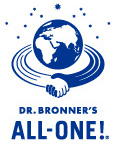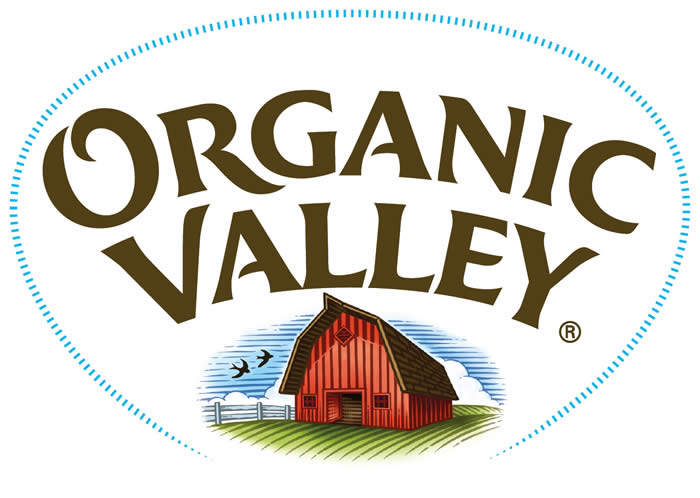The 35th NPF Speakers List
Ecological and Organic Strategies for Regeneration
The 35th National Pesticide Forum
Humphrey School of Public Affairs
Minneapolis, Minnesota
April 28-29, 2017
Schedule of Events
Check back as we continue to add details. Schedule is preliminary and still subject to change.
See List of Speakers Here
Click here for our full program.
Friday, April 28
- 11:30am-4:30pm - Local Organic Farm and Beehive tour
- Beehive tour with Pollinate Minnesota, at Urban Roots
- Organic farm tour with May Lee, farmer, Mhonpaj's Garden, at Minnesota Food Association
- 4:00pm - Registration begins
- 4:30-5:30pm - Pesticides 101: Caroline Cox and Melinda Hemmelgarn
- 5:30-6:30pm - Reception with hors d'oeuvres
- 6:30-7:15pm - Welcome address from Ronnie Cummins and Jay Feldman
- 7:15-7:45pm - Keynote: Jim Riddle
- 7:45-8:45pm - Keynote: Liz Carlisle and David Oien
- 8:45-10:30pm - Book signing and reception
Saturday, April 29
- 8:00-8:30am - Breakfast and Registration
- 8:30-8:45am - Welcome
- 8:45-9:10am - Keynote: Don Huber
- 9:10-9:35am - Keynote: Vera Krischik
- 9:35-10:20am - Pesticides: Environmental Health Effects, the Law, and Community
- 10:20-11:00am - Keynote: David Montgomery
- 11:00-11:15am - Break
- 11:15am-12:45pm - Workshop Block 1
- 12:45-1:40pm - Lunch
- 1:40-1:55pm - Mayor Betsy Hodges
- 1:55-2:15pm - Minnesota Representative Rick Hansen
- 2:15-2:45pm - Keynote: Jeff Lowenfels
- 2:45-3:45pm - Adopting Organic Land Management Practices & Questioning Invasives
- 3:45-4:00pm - Break
- 4:00-5:30pm - Workshop Block 2
- 5:45-7:00pm - Dinner
- 7:00-8:00pm - Panel: The Leading Edge of Community-Based Change
- 8:00-8:45pm - Keynote: Jeff Moyer
- 8:45-10:30pm - Reception and Book signing
- Environmental Health: Issues and Answers
- Bees, Pollinators, and Biodiversity
- Threatened Waters: Protecting Watersheds
- Soil Health through Regenerative Practices
- The Essentiality of Seed Purity and Sovereignty
- Organic Land and Invasive Management: From Playing Fields to Farms
- Strategies for Local Action
- Leveraging the Law for Health and the Environment
List of Speakers
Speakers in alphabetical order. List is preliminary only -please check back as we continue to update this list.
 William Arnold, PhD is a Distinguished McKnight University Professor and the Joseph T. and Rose S. Ling Professor and Associate Head of the Department of Civil, Environmental, and Geo- Engineering at the University of Minnesota. His research focuses on the fate of organic chemicals in natural and engineered aquatic systems. He has a B.S. in Chemical Engineering from MIT, an M.S. in Chemical Engineering from Yale University, and Ph.D. in Environmental Engineering from The Johns Hopkins University.
William Arnold, PhD is a Distinguished McKnight University Professor and the Joseph T. and Rose S. Ling Professor and Associate Head of the Department of Civil, Environmental, and Geo- Engineering at the University of Minnesota. His research focuses on the fate of organic chemicals in natural and engineered aquatic systems. He has a B.S. in Chemical Engineering from MIT, an M.S. in Chemical Engineering from Yale University, and Ph.D. in Environmental Engineering from The Johns Hopkins University.
 Bruce Bacon owns and operates Garden Farme, on land that was first purchased by his great grandparents in 1913. Bruce is a permaculturist and his farm is a “new age operation,” as he calls it. He’s been growing speciality crops by hand for restaurants and caterers since the 1990s, and his farm has been certified organic since 1977. Today, he supplies about a dozen local caterers and restaurants with produce and herbs, and trains interns and other growers in exchange for marketing. In 2015, the University of Minnesota Extension Services named it the 2015 Farm Family for Anoka County. He got involved in soil health as a result of going organic and his interest in permaculture design and agro-ecology. Today Bruce uses raised beds, aged manure, and mulch, and holds educational and promotional events on behalf of conservation farming, like “Dinner on the Farm.”
Bruce Bacon owns and operates Garden Farme, on land that was first purchased by his great grandparents in 1913. Bruce is a permaculturist and his farm is a “new age operation,” as he calls it. He’s been growing speciality crops by hand for restaurants and caterers since the 1990s, and his farm has been certified organic since 1977. Today, he supplies about a dozen local caterers and restaurants with produce and herbs, and trains interns and other growers in exchange for marketing. In 2015, the University of Minnesota Extension Services named it the 2015 Farm Family for Anoka County. He got involved in soil health as a result of going organic and his interest in permaculture design and agro-ecology. Today Bruce uses raised beds, aged manure, and mulch, and holds educational and promotional events on behalf of conservation farming, like “Dinner on the Farm.”
 Rosemary Bilchak has an M.S. in Chemistry and an M.B.A in Finance. She has worked in information systems in industries as various as health sciences, telecommunications, government reporting of oil and gas, and international banking. When her husband survived the first round of chemotherapy for a rare form of leukemia, they bought a ranch in Silt, Colorado and raised registered Angus breeding stock. Downsizing to smaller acreage in Hotchkiss, Colorado, they intended to continue to farm organically in their retirement. This dream was short-circuited by the intense spraying of pesticides by a neighbor who continued to target their farm. This brutality led to a court battle that resulted in a precedent-setting decision in Delta (CO) District Court that pesticide drift does indeed, without proof of damages, constitute trespass.
Rosemary Bilchak has an M.S. in Chemistry and an M.B.A in Finance. She has worked in information systems in industries as various as health sciences, telecommunications, government reporting of oil and gas, and international banking. When her husband survived the first round of chemotherapy for a rare form of leukemia, they bought a ranch in Silt, Colorado and raised registered Angus breeding stock. Downsizing to smaller acreage in Hotchkiss, Colorado, they intended to continue to farm organically in their retirement. This dream was short-circuited by the intense spraying of pesticides by a neighbor who continued to target their farm. This brutality led to a court battle that resulted in a precedent-setting decision in Delta (CO) District Court that pesticide drift does indeed, without proof of damages, constitute trespass.
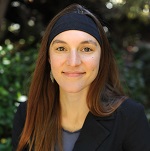
Liz Carlisle, PhD is a lecturer in the School of Earth, Energy, and Environmental Sciences at Stanford University, where she teaches courses on food and agriculture, sustainability transition, and environmental communication. She holds a Ph.D. in Geography from UC Berkeley and she formerly served as Legislative Correspondent for Agriculture and Natural Resources in the Office of U.S. Senator Jon Tester. Recognized for her academic writing with the Elsevier Atlas Award, which honors research with social impact, Liz has also published numerous pieces for general audience readers, in the New York Times, Los Angeles Times, Business Insider, and Stanford Social Innovation Review. Recently, she is the author of the book Lentil Underground, which chronicles the sustainable agriculture movement in her home state of Montana.
 Caroline Cox is research director at the Center for Environmental Health in Oakland, CA. Previously she served as staff scientist at the Northwest Coalition for Alternatives to Pesticides. Prior to working at NCAP, she had nearly ten years experience as a senior research assistant at Oregon State University where she conducted research on the biological control of agricultural weeds. Caroline serves as a public interest representative to the U.S. EPA's Pesticide Program Dialogue Committee. She also serves on the Board of Directors of Beyond Pesticides. She writes and speaks regularly as a national expert on the toxicity of and alternatives to pesticides.
Caroline Cox is research director at the Center for Environmental Health in Oakland, CA. Previously she served as staff scientist at the Northwest Coalition for Alternatives to Pesticides. Prior to working at NCAP, she had nearly ten years experience as a senior research assistant at Oregon State University where she conducted research on the biological control of agricultural weeds. Caroline serves as a public interest representative to the U.S. EPA's Pesticide Program Dialogue Committee. She also serves on the Board of Directors of Beyond Pesticides. She writes and speaks regularly as a national expert on the toxicity of and alternatives to pesticides.
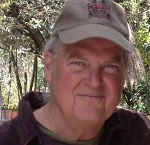 Ronnie Cummins is co-founder and International Director of the Organic Consumers Association (OCA) and its Mexico affiliate Via Organica www.viaorganica.org. Mr. Cummins has been active as a writer and activist since the 1960s, with extensive experience in public education, grassroots mobilization, and marketplace pressure campaigns. Over the past two decades he has served as director of US and international campaigns dealing with sustainable agriculture issues including food safety, genetic engineering, factory farming, and global warming. From 1992-98 Cummins served as a campaign director for the Foundation on Economic Trends in Washington, D.C. In 1998, Cummins co-founded the Organic Consumers Association, the largest network of organic consumers in the USA. In 2009 Cummins founded Via Organica, a network of organic consumers and farmers based in Mexico City and San Miguel de Allende, Guanajuato. In 2015 Cummins co-founded with 60 other global scientists, farmers, and activists, Regeneration International, a network dedicated to mitigating and reversing climate change through regenerative food, farming and land use. Cummins is a frequent lecturer, both in the US and abroad as well as a regular contributor to online publications such as Organic Bytes, Common Dreams, Truthout, Alternet, and Eco-Watch. Cummins has published hundreds of articles in the alternative and mainstream press. He is also the author of a series of children’s books called Children of the World, as well as the book Genetically Engineered Food: A Self-Defense Guide for Consumers. Cummins lives with his wife and 19-year-old son in Minnesota and in San Miguel de Allende, Mexico.
Ronnie Cummins is co-founder and International Director of the Organic Consumers Association (OCA) and its Mexico affiliate Via Organica www.viaorganica.org. Mr. Cummins has been active as a writer and activist since the 1960s, with extensive experience in public education, grassroots mobilization, and marketplace pressure campaigns. Over the past two decades he has served as director of US and international campaigns dealing with sustainable agriculture issues including food safety, genetic engineering, factory farming, and global warming. From 1992-98 Cummins served as a campaign director for the Foundation on Economic Trends in Washington, D.C. In 1998, Cummins co-founded the Organic Consumers Association, the largest network of organic consumers in the USA. In 2009 Cummins founded Via Organica, a network of organic consumers and farmers based in Mexico City and San Miguel de Allende, Guanajuato. In 2015 Cummins co-founded with 60 other global scientists, farmers, and activists, Regeneration International, a network dedicated to mitigating and reversing climate change through regenerative food, farming and land use. Cummins is a frequent lecturer, both in the US and abroad as well as a regular contributor to online publications such as Organic Bytes, Common Dreams, Truthout, Alternet, and Eco-Watch. Cummins has published hundreds of articles in the alternative and mainstream press. He is also the author of a series of children’s books called Children of the World, as well as the book Genetically Engineered Food: A Self-Defense Guide for Consumers. Cummins lives with his wife and 19-year-old son in Minnesota and in San Miguel de Allende, Mexico.
 Mark Davis, PhD is DeWitt Wallace Professor of Biology at Macalester College. He is widely known for his research, writings, and presentations on the ecology of introduced species and the field of invasion biology. In 2000, using insights gained from succession ecology, Davis, along with collaborators Philip Grime and Ken Thompson, developed a new theory to explain community invasibility. Presented in the Journal of Ecology (Davis et al. 2000), the Fluctuating Resource Availability Theory of Invasibility predicts that a plant community will become more susceptible to invasion whenever there is an increase in the amount of unused resources. This paper has been cited more than 2400 times. In 2009, Oxford University Press published his Invasion Biology, in which Davis criticized the field of invasion biology for not recognizing the normative dimensions to the field. In 2011, Nature published an essay Davis and 18 coauthors wrote, titled Don't Judge Species on Their Origins. This essay elicited vigorous discussion within the field of ecology, discussion which continues today, as illustrated by the more than 500 citations it has received since its publication.
Mark Davis, PhD is DeWitt Wallace Professor of Biology at Macalester College. He is widely known for his research, writings, and presentations on the ecology of introduced species and the field of invasion biology. In 2000, using insights gained from succession ecology, Davis, along with collaborators Philip Grime and Ken Thompson, developed a new theory to explain community invasibility. Presented in the Journal of Ecology (Davis et al. 2000), the Fluctuating Resource Availability Theory of Invasibility predicts that a plant community will become more susceptible to invasion whenever there is an increase in the amount of unused resources. This paper has been cited more than 2400 times. In 2009, Oxford University Press published his Invasion Biology, in which Davis criticized the field of invasion biology for not recognizing the normative dimensions to the field. In 2011, Nature published an essay Davis and 18 coauthors wrote, titled Don't Judge Species on Their Origins. This essay elicited vigorous discussion within the field of ecology, discussion which continues today, as illustrated by the more than 500 citations it has received since its publication.
Paula Dinerstein is senior counsel for Public Employees for Environmental Responsibility (PEER) and an attorney with over 18 years of experience. Prior to joining PEER, she clerked for a federal district court judge in Washington DC and then practiced with small public-interest oriented law firms. Her work included representation of States and advocacy groups in energy and environmental matters, including recovery for overcharges by oil companies for use in state energy conservation programs, challenges to EPA pesticide registrations, challenges to hydroelectric licenses, and litigation concerning regulations which weakened the federal organic food standards.
 Maggie Douglas, PhD is a postdoctoral scholar at the Center for Pollinator Research at Pennsylvania State University. Her research uses ecological principles to understand and improve agricultural systems, with a particular focus on how farming practices can conserve populations of beneficial insects while minimizing pest populations. Her recent work characterized trends in neonicotinoid seed coatings and their non-target effects on predatory insects. Currently she is synthesizing national datasets on pesticide use to inform pollinator conservation in agricultural landscapes.
Maggie Douglas, PhD is a postdoctoral scholar at the Center for Pollinator Research at Pennsylvania State University. Her research uses ecological principles to understand and improve agricultural systems, with a particular focus on how farming practices can conserve populations of beneficial insects while minimizing pest populations. Her recent work characterized trends in neonicotinoid seed coatings and their non-target effects on predatory insects. Currently she is synthesizing national datasets on pesticide use to inform pollinator conservation in agricultural landscapes.
 Mac Ehrhardt is the 3rd-generation owner of Albert Lea Seed House in Albert Lea, MN. Albert Lea Seed is a family-owned and operated seed company that has been providing field seed to farmers in the region and nationwide since 1923. He grew up in the seed business and received his formal agricultural education at the University of California, Davis. Mac has worked full-time at the Albert Lea Seed House since 1991 and was instrumental in guiding its growth including the launch of Certified Organic field seed in 1996, now known as Albert Lea Seed Organics. Albert Lea Seed is one of the largest suppliers of Certified Organic grain and forage seed in the nation. He has served on the Board of NorthStar Genetics, and also on the boards of several non-profit groups including: The Non-GMO Supply Chain Working Group, Freeborn Co. Corn & Soybean Growers Assn., Sustainable Farming Association of Minnesota, Minnesota Seed Producers and Processors Assn., and the United States Testing Network.
Mac Ehrhardt is the 3rd-generation owner of Albert Lea Seed House in Albert Lea, MN. Albert Lea Seed is a family-owned and operated seed company that has been providing field seed to farmers in the region and nationwide since 1923. He grew up in the seed business and received his formal agricultural education at the University of California, Davis. Mac has worked full-time at the Albert Lea Seed House since 1991 and was instrumental in guiding its growth including the launch of Certified Organic field seed in 1996, now known as Albert Lea Seed Organics. Albert Lea Seed is one of the largest suppliers of Certified Organic grain and forage seed in the nation. He has served on the Board of NorthStar Genetics, and also on the boards of several non-profit groups including: The Non-GMO Supply Chain Working Group, Freeborn Co. Corn & Soybean Growers Assn., Sustainable Farming Association of Minnesota, Minnesota Seed Producers and Processors Assn., and the United States Testing Network.
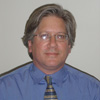
Jay Feldman is a cofounder of the organization and has served as its director since 1981. Jay dedicated himselfto finding solutions to pesticide problems after working with farmworkers and small farmers through an EPA grant in 1978 to the national advocacy organization Rural America (1977-1981). Since that time, Jay has helped to build Beyond Pesticides' capacity to assist local groups and impact national pesticide policy. He has tracked specific chemical effects, regulatory actions, and pesticide law. He is very familiar with local groups working on pesticides and has helped develop successful strategies for reform in local communities. His work with media has helped to bring broader public understanding of the hazards of pesticides. Jay has a Masters in urban and regional planning with a focus on health policy from Virginia Polytechnic Institute and State University (1977), and a B.A. from Grinnell College (1975) in political science. In September 2009, U.S. Department of Agriculture Secretary Tom Vilsack appointed Jay to the National Organic Standards Board (NOSB), where he completed a 5 year term in January 2015.
 Stephen Gregg has worked at Mother Earth Gardens and as an ecological landscaper in the greater Twin Cities since 2013. He is a worker-owner at Perennial Partners Nursery a perennial plant nursery focused on growing plants of high human or wildlife value, which he founded in 2015. His urban farming experience started at City Farms in Chicago in 2009. His home ecosystem includes backyard chickens and ducks, a collection food and beverage fermentations, and a permaculture landscape. An active forager and amateur mycologist, Stephen is collaborating with illustrator Rachel Rolseth on a mushroom foraging zine due out in summer 2017.
Stephen Gregg has worked at Mother Earth Gardens and as an ecological landscaper in the greater Twin Cities since 2013. He is a worker-owner at Perennial Partners Nursery a perennial plant nursery focused on growing plants of high human or wildlife value, which he founded in 2015. His urban farming experience started at City Farms in Chicago in 2009. His home ecosystem includes backyard chickens and ducks, a collection food and beverage fermentations, and a permaculture landscape. An active forager and amateur mycologist, Stephen is collaborating with illustrator Rachel Rolseth on a mushroom foraging zine due out in summer 2017.

State Representative Rick Hansen (52A) is in his seventh term at the Minnesota House of Representatives, representing the areas of West St. Paul, Mendota Heights, and Lilydale. Rep. Hansen was born in Albert Lea, Minnesota and is married to Suzanne with one son, Evan. He was raised on a family farm in rural Freeborn, Minnesota. Rep. Hansen graduated from Upper Iowa University with a Bachelor of Science degree in Biology and graduated with a Master of Science degree in Soil Management from Iowa State University. Rep. Hansen is the DFL-Lead on the House Committee on Environment and Natural Resources Policy and Finance. Rep. Hansen has authored nation leading legislation on pollinator and environmental protections.
Nichelle Harriott is the Science and Regulatory Director at Beyond Pesticides. She has earned her BS in chemistry and environmental science at Morgan State University and her MS in Environmental Science and Public Policy at George Mason University. She joined Beyond Pesticides in the summer of 2007, having previously worked on several conservation and public health issues. At Beyond Pesticides, Ms. Harriott reviews pesticide substances and their impacts on human and environmental health, as part of a broader effort to provide decision-makers and the general public with information in support of sustainable management of indoor and outdoor environments. She also leads and coordinates the pollinator protection campaign at Beyond Pesticides which has developed several educational materials, policy recommendations, and local legislation and grassroots action. She is responsible for submitting regulatory comments to EPA regarding pesticide registrations and uses, and is the author of several articles and brochures exploring the connection between chemical contaminants and human health.
 Patricia Hauser is a Co-Founder of the grassroots, 100% volunteer, non-profit bee/pollinator protection advocacy group, Humming for Bees which she helps run. In 2014 Humming for Bees worked with the Shorewood, MN City Council to ban systemic pesticides, including neonicotinoids, on city property and pass the first Bee-Safe City Resolution in the state of Minnesota. In 2015 Patricia Co-Chaired the League of Women Voters Minnesota Bee Briefing Paper Committee; helped write, edit, and distribute the final paper entitled: The Impact of Neonicotinoids on Honey Bees. Patricia is a retired elementary public school teacher from Minneapolis who has always loved the out of doors
Patricia Hauser is a Co-Founder of the grassroots, 100% volunteer, non-profit bee/pollinator protection advocacy group, Humming for Bees which she helps run. In 2014 Humming for Bees worked with the Shorewood, MN City Council to ban systemic pesticides, including neonicotinoids, on city property and pass the first Bee-Safe City Resolution in the state of Minnesota. In 2015 Patricia Co-Chaired the League of Women Voters Minnesota Bee Briefing Paper Committee; helped write, edit, and distribute the final paper entitled: The Impact of Neonicotinoids on Honey Bees. Patricia is a retired elementary public school teacher from Minneapolis who has always loved the out of doors
 Melinda Hemmelgarn, M.S., R.D., is a Registered Dietitian, "investigative" nutritionist and advocate for social and environmental justice in the food system. She believes in using the power of art and media to influence public opinion, change public policy, and improve quality of life. She is a freelance writer, speaker, and host of nationally syndicated Food Sleuth Radio. Her mission: Help people "think beyond their plates;" connect the dots between food, health and agriculture; and, promote critical thinking and "food system literacy."
Melinda Hemmelgarn, M.S., R.D., is a Registered Dietitian, "investigative" nutritionist and advocate for social and environmental justice in the food system. She believes in using the power of art and media to influence public opinion, change public policy, and improve quality of life. She is a freelance writer, speaker, and host of nationally syndicated Food Sleuth Radio. Her mission: Help people "think beyond their plates;" connect the dots between food, health and agriculture; and, promote critical thinking and "food system literacy."
 Russ Henry founded (in 2005) and today still operates Giving Tree Gardens, an organic environmental services company that focuses on rebuilding local ecosystems while growing beautiful landscapes. Soil health, composting, rain gardens, butterfly gardens, pollinator friendly landscapes, shoreline restoration, organic lawn care, and landscape design are all a part of Giving Tree Gardens work. Russ is currently working with partners in development of a business called New Land which performs soil health consulting and products for area farmers and growers. Russ also enjoys a great deal of advocacy extending beyond business into community partnership, he is currently running for election to the Minneapolis Park Board of Commissioners.
Russ Henry founded (in 2005) and today still operates Giving Tree Gardens, an organic environmental services company that focuses on rebuilding local ecosystems while growing beautiful landscapes. Soil health, composting, rain gardens, butterfly gardens, pollinator friendly landscapes, shoreline restoration, organic lawn care, and landscape design are all a part of Giving Tree Gardens work. Russ is currently working with partners in development of a business called New Land which performs soil health consulting and products for area farmers and growers. Russ also enjoys a great deal of advocacy extending beyond business into community partnership, he is currently running for election to the Minneapolis Park Board of Commissioners.
 Michelle Hladik, PhD is a research chemist at USGS California Water Science Center in Sacramento. Her research focuses on the fate and transport of current-use pesticides and other organic contaminants in aquatic and terrestrial environments. She leads an analytical laboratory that develops new methods to measure pesticides and their degradates in water, sediment, and biota. She has a B.A. in chemistry from Vassar College and a Ph.D. in environmental engineering from Johns Hopkins University.
Michelle Hladik, PhD is a research chemist at USGS California Water Science Center in Sacramento. Her research focuses on the fate and transport of current-use pesticides and other organic contaminants in aquatic and terrestrial environments. She leads an analytical laboratory that develops new methods to measure pesticides and their degradates in water, sediment, and biota. She has a B.A. in chemistry from Vassar College and a Ph.D. in environmental engineering from Johns Hopkins University.
Mayor Betsy Hodges is the mayor of Minneapolis. A member of the Minnesota Democratic-Farmer-Labor Party, she represented Ward 13 on the Minneapolis City Council from January 2006 until January 2014. Hodges was reelected to the city council in the 2009 Minneapolis municipal elections. Hodges won the 2013 Minneapolis mayoral election and was inaugurated on January 2, 2014.
 Lex Horan is an organizer in Pesticide Action Network's Minneapolis office, where he leads PAN's Minnesota campaigns. PAN works alongside those most impacted by hazardous pesticides -- family farmers, rural communities, beekeepers, and Native communities -- to take back our food system from pesticide and biotech corporations. Lex was born and raised in St. Paul, Minnesota, and he has been part of movements for social justice for the past 10 years.
Lex Horan is an organizer in Pesticide Action Network's Minneapolis office, where he leads PAN's Minnesota campaigns. PAN works alongside those most impacted by hazardous pesticides -- family farmers, rural communities, beekeepers, and Native communities -- to take back our food system from pesticide and biotech corporations. Lex was born and raised in St. Paul, Minnesota, and he has been part of movements for social justice for the past 10 years.
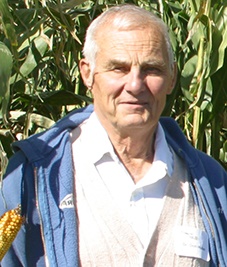 Don Huber, PhD is professor emeritus of plant pathology at Purdue University. He received B.S. and M.S. degrees from the University of Idaho, a Ph.D. from Michigan State University, and is a graduate of the U.S. Army Command & General Staff College and Industrial College of the Armed Forces. He was cereal pathologist at the University of Idaho for 8 years before joining the Department of Botany & Plant Pathology at Purdue University in 1971. His agricultural research the past 50 years has focused on the epidemiology and control of soilborne plant pathogens with emphasis on microbial ecology, cultural and biological controls, and physiology of host-parasite relationships. Research also includes nitrogen metabolism, micronutrient physiology, inhibition of nitrification, and nutrient-disease interactions. In addition to his academic positions and research, he is internationally recognized for his expertise in the development of nitrification inhibitors to improve the efficiency of N fertilizers, interactions of the form of nitrogen, manganese and other nutrients in disease, herbicide-nutrient-disease interactions, techniques for rapid microbial identification, and cultural control of plant diseases.
Don Huber, PhD is professor emeritus of plant pathology at Purdue University. He received B.S. and M.S. degrees from the University of Idaho, a Ph.D. from Michigan State University, and is a graduate of the U.S. Army Command & General Staff College and Industrial College of the Armed Forces. He was cereal pathologist at the University of Idaho for 8 years before joining the Department of Botany & Plant Pathology at Purdue University in 1971. His agricultural research the past 50 years has focused on the epidemiology and control of soilborne plant pathogens with emphasis on microbial ecology, cultural and biological controls, and physiology of host-parasite relationships. Research also includes nitrogen metabolism, micronutrient physiology, inhibition of nitrification, and nutrient-disease interactions. In addition to his academic positions and research, he is internationally recognized for his expertise in the development of nitrification inhibitors to improve the efficiency of N fertilizers, interactions of the form of nitrogen, manganese and other nutrients in disease, herbicide-nutrient-disease interactions, techniques for rapid microbial identification, and cultural control of plant diseases.
 Shaina Kasper is Toxics Action Center's Vermont State Director and also works as a community organizer in New Hampshire. She grew up in Vermont, and is a graduate of the United World College in New Mexico, the International Honors Program, and Macalester College. Her organizing experience includes fossil fuel divestment, housing and economic justice issues, promoting good governance, international public water organizing, and the JOIN for Justice Jewish organizing fellowship. At Toxics Action Center, Shaina works out of the Montpelier, Vermont office to assist community groups to clean up and prevent pollution issues in their neighborhoods -- everything from cleaning up hazardous waste sites, curbing pesticide pollution, unregulated contaminants in drinking water, stopping landfill leaching and promoting zero waste, and shutting down dirty fossil fuel infrastructure -- by providing information, networking, and side-by-side community organizing assistance.
Shaina Kasper is Toxics Action Center's Vermont State Director and also works as a community organizer in New Hampshire. She grew up in Vermont, and is a graduate of the United World College in New Mexico, the International Honors Program, and Macalester College. Her organizing experience includes fossil fuel divestment, housing and economic justice issues, promoting good governance, international public water organizing, and the JOIN for Justice Jewish organizing fellowship. At Toxics Action Center, Shaina works out of the Montpelier, Vermont office to assist community groups to clean up and prevent pollution issues in their neighborhoods -- everything from cleaning up hazardous waste sites, curbing pesticide pollution, unregulated contaminants in drinking water, stopping landfill leaching and promoting zero waste, and shutting down dirty fossil fuel infrastructure -- by providing information, networking, and side-by-side community organizing assistance.
 Ruth Kerzee is the Executive Director of Midwest Pesticide Action Center. Midwest Pesticide Action Center is located in Chicago but works regionally to reduce the health risks and environmental impacts of pesticides by promoting safer alternatives in: housing; schools and childcare facilities; outdoor spaces such as residential lawns, public parks, and other publically owned properties; and the development of municipal and state policies. MPAC has won Illinois’ Governor’s Pollution Prevention Award for their housing work, and the US EPA’s Environmental Justice Award for their work with childcares. Ms. Kerzee has a Master of Science degree in Public Health from the University of Illinois at Chicago (UIC) and over two decades of experience practicing public health, including conducting research and training programs on health issues such as childhood lead poisoning and migrant farm-worker injuries. She is passionate about the prevention of disease and injury by promoting sound public health practices.
Ruth Kerzee is the Executive Director of Midwest Pesticide Action Center. Midwest Pesticide Action Center is located in Chicago but works regionally to reduce the health risks and environmental impacts of pesticides by promoting safer alternatives in: housing; schools and childcare facilities; outdoor spaces such as residential lawns, public parks, and other publically owned properties; and the development of municipal and state policies. MPAC has won Illinois’ Governor’s Pollution Prevention Award for their housing work, and the US EPA’s Environmental Justice Award for their work with childcares. Ms. Kerzee has a Master of Science degree in Public Health from the University of Illinois at Chicago (UIC) and over two decades of experience practicing public health, including conducting research and training programs on health issues such as childhood lead poisoning and migrant farm-worker injuries. She is passionate about the prevention of disease and injury by promoting sound public health practices.
 Jack Kloppenburg, PhD is Professor Emeritus in the Department of Community and Environmental Sociology at the University of Wisconsin-Madison. He is an Emeritus Director of the GreenHouse Residential Learning Community and is affiliated with the Nelson Institute for Environmental Studies and the Agroecology Program. His research has involved study of the social impacts of biotechnology, the emergence of managed grazing networks in Wisconsin’s dairy industry, and the re-valuation of local and indigenous knowledge systems. In his work on the “foodshed,” he has envisioned the emergence of a sustainable food system founded on local/regional food production, regional reinvestment of capital, local job creation, the strength of community institutions, and direct democratic participation in the local food economy. An organizer as well as an academic, he is a founder of the REAP Food Group, a non-profit organization working for a just and sustainable food system. He is perhaps best known for his work on access to and control over plant genetic resources. He is the author of the influential First the Seed: The Political Economy of Plant Botechnology,1492-2000. He is currently excited by the potential of the growing movement for “food sovereignty” and by the possibilities of applying “open source” principles in the biosciences. He is a founder and board member of the Open Source Seed Initiative (OSSI), an organization committed to facilitating vigorous innovation in plant breeding by preserving the right to unencumbered use of shared seeds and their progeny in breeding programs. Over 300 OSSI-Pledged varieties of “freed seed” are now available from 44 OSSI Partner seed companies.
Jack Kloppenburg, PhD is Professor Emeritus in the Department of Community and Environmental Sociology at the University of Wisconsin-Madison. He is an Emeritus Director of the GreenHouse Residential Learning Community and is affiliated with the Nelson Institute for Environmental Studies and the Agroecology Program. His research has involved study of the social impacts of biotechnology, the emergence of managed grazing networks in Wisconsin’s dairy industry, and the re-valuation of local and indigenous knowledge systems. In his work on the “foodshed,” he has envisioned the emergence of a sustainable food system founded on local/regional food production, regional reinvestment of capital, local job creation, the strength of community institutions, and direct democratic participation in the local food economy. An organizer as well as an academic, he is a founder of the REAP Food Group, a non-profit organization working for a just and sustainable food system. He is perhaps best known for his work on access to and control over plant genetic resources. He is the author of the influential First the Seed: The Political Economy of Plant Botechnology,1492-2000. He is currently excited by the potential of the growing movement for “food sovereignty” and by the possibilities of applying “open source” principles in the biosciences. He is a founder and board member of the Open Source Seed Initiative (OSSI), an organization committed to facilitating vigorous innovation in plant breeding by preserving the right to unencumbered use of shared seeds and their progeny in breeding programs. Over 300 OSSI-Pledged varieties of “freed seed” are now available from 44 OSSI Partner seed companies.
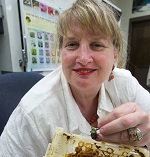 Vera Krischik, PhD is a tenured Faculty in the Entomology Department in the College of Food, Agricultural and Natural Resource Sciences at the University of Minnesota. Vera obtained her PhD from the University of Maryland and continued on as a PostDoc at the New York Botanical Garden. Krischik held a NSF sponsored Visiting Professor for Women from 1991-1993. Krischik was an IPM coordinator at the USDA in Washington DC from 1988-1994. Since 1995, Krischik has been a professor in the Department of Entomology at the University of Minnesota. Krischik teaches 2 courses; ENT 5009, Pesticide Use and Misuse; and ENT 4015, Ornamental and Turf IPM. Krischik was author on three books: one published in 1991, the first USDA grain insect management manual, that is still being published today; a second book in 1991 by John Wiley entitled "Microbial Mediation of Plant Insect Interactions"; and another published in 2004 by the MN Agricultural Experiment Station on "IPM of Midwest Landscapes", 316 pp. Krischik has partnered with MDA, DNR, MNLA, MNTGF, and watershed districts for her outreach and research programs and publications. Krischik teaches at least 5 large workshops each year on proper pesticides use in cooperation with MDA and MNLA. She has trained 8 graduate students and 1 post doc. Since 1998 Krischik has been director of CUES: Center for sustainable urban ecosystems that promote sustainable landscapes and conservation of beneficial insects, online at cues.cfans.umn.edu/. In 2010 and 2014 Krischik received an LCCMR grant on mitigating pollinator decline. Outreach pollinator educational products include 5 websites, a poster on the right plants for bees, 7 pesticide and bee bulletins, webinar, native bee and citizen science project, an online workshop, and many yearly talks.
Vera Krischik, PhD is a tenured Faculty in the Entomology Department in the College of Food, Agricultural and Natural Resource Sciences at the University of Minnesota. Vera obtained her PhD from the University of Maryland and continued on as a PostDoc at the New York Botanical Garden. Krischik held a NSF sponsored Visiting Professor for Women from 1991-1993. Krischik was an IPM coordinator at the USDA in Washington DC from 1988-1994. Since 1995, Krischik has been a professor in the Department of Entomology at the University of Minnesota. Krischik teaches 2 courses; ENT 5009, Pesticide Use and Misuse; and ENT 4015, Ornamental and Turf IPM. Krischik was author on three books: one published in 1991, the first USDA grain insect management manual, that is still being published today; a second book in 1991 by John Wiley entitled "Microbial Mediation of Plant Insect Interactions"; and another published in 2004 by the MN Agricultural Experiment Station on "IPM of Midwest Landscapes", 316 pp. Krischik has partnered with MDA, DNR, MNLA, MNTGF, and watershed districts for her outreach and research programs and publications. Krischik teaches at least 5 large workshops each year on proper pesticides use in cooperation with MDA and MNLA. She has trained 8 graduate students and 1 post doc. Since 1998 Krischik has been director of CUES: Center for sustainable urban ecosystems that promote sustainable landscapes and conservation of beneficial insects, online at cues.cfans.umn.edu/. In 2010 and 2014 Krischik received an LCCMR grant on mitigating pollinator decline. Outreach pollinator educational products include 5 websites, a poster on the right plants for bees, 7 pesticide and bee bulletins, webinar, native bee and citizen science project, an online workshop, and many yearly talks.
 Mark Liebaert is the Douglas County Board Chair and Chair of Forestry. He was the past Chair of Land Conservation Committee. He owns and operates a 108 year old, 600 acre family farm. He and his family grass finish and direct market their Angus Beef from the farm, and they do not use herbicides, pesticides, antibiotics or fertilizers. He is a Board Member of the Wisconsin Farmers Union.
Mark Liebaert is the Douglas County Board Chair and Chair of Forestry. He was the past Chair of Land Conservation Committee. He owns and operates a 108 year old, 600 acre family farm. He and his family grass finish and direct market their Angus Beef from the farm, and they do not use herbicides, pesticides, antibiotics or fertilizers. He is a Board Member of the Wisconsin Farmers Union.
 Jeff Lowenfels is the longest running garden columnist in North America, a noted author, a huge proponent of organics and, without a question, the most entertaining horticultural speaker on the circuit. He is also the author of two award-winning, best-selling books on organic growing, farming and gardening. His third book, Teaming with Fungi: The Organic Gardener’s Guide to Mycorrhizae was published early this year. Jeff Lowenfels is a national leader in the organic gardening/sustainability movement. He is a past president of the Garden Writers of America, a GWA Fellow and was inducted into the GWA Hall of Fame in 2005, the highest honor a North American garden writer can achieve.
Jeff Lowenfels is the longest running garden columnist in North America, a noted author, a huge proponent of organics and, without a question, the most entertaining horticultural speaker on the circuit. He is also the author of two award-winning, best-selling books on organic growing, farming and gardening. His third book, Teaming with Fungi: The Organic Gardener’s Guide to Mycorrhizae was published early this year. Jeff Lowenfels is a national leader in the organic gardening/sustainability movement. He is a past president of the Garden Writers of America, a GWA Fellow and was inducted into the GWA Hall of Fame in 2005, the highest honor a North American garden writer can achieve.
Lani Malmberg 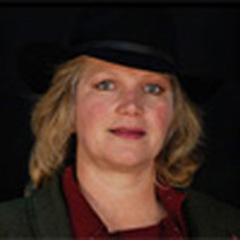 grew up in a cattle ranching family. While in graduate school studying weed science, Lani got the idea to offer a goat grazing service for those who did not want to spray chemicals for weed management. She has grown her business, Goats Eat Weeds, to 1,200 cashmere goats, working for governments and private landowners for noxious weed control, fire reduction, re-seeding, watershed management, and land restoration. The company also offers noxious weed mapping and inventory. Ms. Malmberg owns no land, and considers herself a ‘gypsy’ goat herder, working in 10 western states. She is vice-president of the Board of Directors of Beyond Pesticides.
grew up in a cattle ranching family. While in graduate school studying weed science, Lani got the idea to offer a goat grazing service for those who did not want to spray chemicals for weed management. She has grown her business, Goats Eat Weeds, to 1,200 cashmere goats, working for governments and private landowners for noxious weed control, fire reduction, re-seeding, watershed management, and land restoration. The company also offers noxious weed mapping and inventory. Ms. Malmberg owns no land, and considers herself a ‘gypsy’ goat herder, working in 10 western states. She is vice-president of the Board of Directors of Beyond Pesticides.
 Josephine Marcotty writes about nature and the environment for the Star Tribune in Minneapolis, MN. She came to the Star Tribune in 1979 and has also worked as a business reporter, medical reporter and a health and science editor. As a medical reporter, she has received numerous awards for her coverage of mental illness in Minnesota. As an environmental reporter she won national awards for her series “Bees on the Brink,” and for beat reporting. She writes about agriculture, mining, and, most of all, water in the Land of 10,000 lakes.
Josephine Marcotty writes about nature and the environment for the Star Tribune in Minneapolis, MN. She came to the Star Tribune in 1979 and has also worked as a business reporter, medical reporter and a health and science editor. As a medical reporter, she has received numerous awards for her coverage of mental illness in Minnesota. As an environmental reporter she won national awards for her series “Bees on the Brink,” and for beat reporting. She writes about agriculture, mining, and, most of all, water in the Land of 10,000 lakes.
 John Mesko is a familiar face in the Midwest agriculture community. He joined the team at MOSES in September 2016. Prior to that, he headed the Sustainable Farming Association (SFA) in Minnesota. John has a bachelor’s in agronomy and a master’s in farm management from Purdue University. His unique career has covered all facets of agriculture, from his early days in fertilizer sales and biotechnology research to his current focus on organic and sustainable farming. In each role, he has worked to promote a better understanding and appreciation of how food is produced. He sees farmers as the original caretakers of the environment, and strives to bring the food and farming community together to promote farming practices that produce abundant, healthy food in a sustainable manner. He and his wife, Lisa, have two daughters, Gabrielle and Sarah. The family owns a grass-fed beef operation in east central Minnesota. They live in the Twin Cities. John teaches a college-level environmental science class, and regularly speaks about sustainability, farming, and the future of agriculture.
John Mesko is a familiar face in the Midwest agriculture community. He joined the team at MOSES in September 2016. Prior to that, he headed the Sustainable Farming Association (SFA) in Minnesota. John has a bachelor’s in agronomy and a master’s in farm management from Purdue University. His unique career has covered all facets of agriculture, from his early days in fertilizer sales and biotechnology research to his current focus on organic and sustainable farming. In each role, he has worked to promote a better understanding and appreciation of how food is produced. He sees farmers as the original caretakers of the environment, and strives to bring the food and farming community together to promote farming practices that produce abundant, healthy food in a sustainable manner. He and his wife, Lisa, have two daughters, Gabrielle and Sarah. The family owns a grass-fed beef operation in east central Minnesota. They live in the Twin Cities. John teaches a college-level environmental science class, and regularly speaks about sustainability, farming, and the future of agriculture.
 David R. Montgomery, PhD is a MacArthur Fellow and professor of geomorphology at the University of Washington. He is an internationally recognized geologist who studies landscape evolution and the effects of geological processes on ecological systems and human societies. An author of award-winning popular-science books, he has been featured in documentary films, network and cable news, and on a wide variety of TV and radio programs, including NOVA, PBS NewsHour, Fox and Friends, and All Things Considered. When not writing or doing geology, he plays guitar and piano in the band Big Dirt. He lives in Seattle, with his wife Anne Biklé and their black lab guide-dog dropout Loki. Connect with him at www.dig2grow.com or follow him on Twitter (@dig2grow).
David R. Montgomery, PhD is a MacArthur Fellow and professor of geomorphology at the University of Washington. He is an internationally recognized geologist who studies landscape evolution and the effects of geological processes on ecological systems and human societies. An author of award-winning popular-science books, he has been featured in documentary films, network and cable news, and on a wide variety of TV and radio programs, including NOVA, PBS NewsHour, Fox and Friends, and All Things Considered. When not writing or doing geology, he plays guitar and piano in the band Big Dirt. He lives in Seattle, with his wife Anne Biklé and their black lab guide-dog dropout Loki. Connect with him at www.dig2grow.com or follow him on Twitter (@dig2grow).
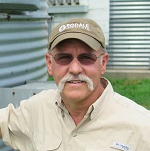 Jeff Moyer is a world renowned authority in organic agriculture. His expertise includes organic crop production systems with a focus on weed management, cover crops, crop rotations, equipment modification and use, and facilities design. Jeff is perhaps most well-known for conceptualizing and popularizing the No Till Roller Crimper for use in organic agriculture. In 2011, he wrote Organic No-Till Farming, a publication that has become a resource for farmers throughout the world. Jeff brings a farmer’s perspective and approach to issues in organic agriculture. He is a past chair of the National Organic Standards Board, a founding board member of Pennsylvania Certified Organic, the Chairman of the Board of Director of The Seed Farm, part of the Green America Non-GMO Working Group, a Project Member of The Noble Foundation’s Soil Renaissance project, and a Board Member of PA Farm Link. In September 2015, Jeff was appointed as Executive Director of Rodale Institute after spending the last four decades at the Institute, helping countless farmers make the transition from conventional, chemical-based farming to organic methods.
Jeff Moyer is a world renowned authority in organic agriculture. His expertise includes organic crop production systems with a focus on weed management, cover crops, crop rotations, equipment modification and use, and facilities design. Jeff is perhaps most well-known for conceptualizing and popularizing the No Till Roller Crimper for use in organic agriculture. In 2011, he wrote Organic No-Till Farming, a publication that has become a resource for farmers throughout the world. Jeff brings a farmer’s perspective and approach to issues in organic agriculture. He is a past chair of the National Organic Standards Board, a founding board member of Pennsylvania Certified Organic, the Chairman of the Board of Director of The Seed Farm, part of the Green America Non-GMO Working Group, a Project Member of The Noble Foundation’s Soil Renaissance project, and a Board Member of PA Farm Link. In September 2015, Jeff was appointed as Executive Director of Rodale Institute after spending the last four decades at the Institute, helping countless farmers make the transition from conventional, chemical-based farming to organic methods.
 Duane Ninneman is the Executive Director of CURE (Clean Up the River Environment), a Minnesota grassroots nonprofit of 25 years that focuses on promoting sustainability in the areas of climate, energy, and water. Ninneman has been with CURE for 12 years. In his role as director, Ninneman concentrates on broadening and deepening the conversations needed to achieve meaningful and lasting results in watershed sustainability, climate solutions and renewable energy adoption. He believes that real progress toward sustainability can only come from honest assessments and a genuine understanding of the complex dynamics that are affecting the environment. Ninneman is a recognized rural environmental leader and shares his understanding of rural history, culture, and the environment as a public speaker and network weaver. Ninneman is a graduate of St. Olaf College with a BA in Anthropology.
Duane Ninneman is the Executive Director of CURE (Clean Up the River Environment), a Minnesota grassroots nonprofit of 25 years that focuses on promoting sustainability in the areas of climate, energy, and water. Ninneman has been with CURE for 12 years. In his role as director, Ninneman concentrates on broadening and deepening the conversations needed to achieve meaningful and lasting results in watershed sustainability, climate solutions and renewable energy adoption. He believes that real progress toward sustainability can only come from honest assessments and a genuine understanding of the complex dynamics that are affecting the environment. Ninneman is a recognized rural environmental leader and shares his understanding of rural history, culture, and the environment as a public speaker and network weaver. Ninneman is a graduate of St. Olaf College with a BA in Anthropology.
 David Oien is a third generation Montana farmer whose grandparents homesteaded on the prairies of northcentral Montana over 110 years ago. For 40 years, David has been an advocate and practitioner of renewable energy and sustainable agriculture, and is a founding member of the Pondera Solar Alliance, the Alternative Energy Resources’s (AERO) Ag Task Force, two OCIA organic farmer chapters, Montana Department of Agriculture’s Organic Advisory Committee, and the Montana Organic Association. He has received AERO’s Sustainable Agriculture Award, MOA’s Lifetime Service Award, and AERO’s 40th Anniversary Leadership in Sustainability Award. David is a co-founder and the President of Timeless Seeds, Inc., a certified organic pulse crop and heritage grain company that is featured in the book LENTIL UNDERGROUND by acclaimed author Liz Carlisle. Timeless contracts with dozens of organic farmers in Montana and markets its products across America to customers like Blue Apron, Eden Foods, Stanford University Dining Services, high end and farm-to-table restaurants, and hundreds of natural food stores including the Wedge and the Lake Winds Coop stores in the Twin Cities.
David Oien is a third generation Montana farmer whose grandparents homesteaded on the prairies of northcentral Montana over 110 years ago. For 40 years, David has been an advocate and practitioner of renewable energy and sustainable agriculture, and is a founding member of the Pondera Solar Alliance, the Alternative Energy Resources’s (AERO) Ag Task Force, two OCIA organic farmer chapters, Montana Department of Agriculture’s Organic Advisory Committee, and the Montana Organic Association. He has received AERO’s Sustainable Agriculture Award, MOA’s Lifetime Service Award, and AERO’s 40th Anniversary Leadership in Sustainability Award. David is a co-founder and the President of Timeless Seeds, Inc., a certified organic pulse crop and heritage grain company that is featured in the book LENTIL UNDERGROUND by acclaimed author Liz Carlisle. Timeless contracts with dozens of organic farmers in Montana and markets its products across America to customers like Blue Apron, Eden Foods, Stanford University Dining Services, high end and farm-to-table restaurants, and hundreds of natural food stores including the Wedge and the Lake Winds Coop stores in the Twin Cities.
 Chip Osborne is a nationally renowned organic turfgrass expert and a professional horticulturist with 35 years experience in greenhouse production as the former owner and operator of Osborne Florist & Greenhouse in Marblehead, MA. Founder and President of Osborne Organics (Marblehead, MA), has over 10 years experience in creating safe, sustainable and healthy athletic fields and landscapes, and 35 years experience as a professional horticulturist. As a wholesale and retail nurseryman he has first hand experience with the pesticides routinely used in the landscape industry. Personal experience led him to believe there must be a safer way to grow plants. His personal investigation, study of conventional and organic soil science practices, and hands-on experimentation led him to become one of the country's leading experts on growing organic turf. Chip is a Beyond Pesticides board member.
Chip Osborne is a nationally renowned organic turfgrass expert and a professional horticulturist with 35 years experience in greenhouse production as the former owner and operator of Osborne Florist & Greenhouse in Marblehead, MA. Founder and President of Osborne Organics (Marblehead, MA), has over 10 years experience in creating safe, sustainable and healthy athletic fields and landscapes, and 35 years experience as a professional horticulturist. As a wholesale and retail nurseryman he has first hand experience with the pesticides routinely used in the landscape industry. Personal experience led him to believe there must be a safer way to grow plants. His personal investigation, study of conventional and organic soil science practices, and hands-on experimentation led him to become one of the country's leading experts on growing organic turf. Chip is a Beyond Pesticides board member.
 Zachary Paige is interested in learning about the origins of cultivated crops, plant breeding, seed saving and wild foods. Zachary served two years as an AmeriCorp VISTA volunteer at the White Earth Land Recovery Project (WELRP) on the White Earth Reservation in Northern Minnesota. Currently serves as the program coordinator of the ‘Upper Midwest Indigenous Seed Keeper Network’ grant project for WELRP. This project was funded by the Administration of Native Americans and serves 13 native communities across Minnesota, North Dakota, Wisconsin and Iowa. Zachary graduated from the Sustainable Food Production program at MState in 2013, now known as the Deep Roots Program through the Sustainable Farming Association in Minnesota. He is currently working on an MA in the Plant Breeding Distance Program at Iowa State University and currently works on various breeding projects for organic growing systems. For the last five years, he has been the primary organizer for the Indigenous Farming Conference for WELRP. Zachary also contracts with the White Earth Band of Ojibwe as the Food Sovereignty Coordinator and is working with the community to expand agricultural production of Indigenous foods such as corn, beans and pumpkins.
Zachary Paige is interested in learning about the origins of cultivated crops, plant breeding, seed saving and wild foods. Zachary served two years as an AmeriCorp VISTA volunteer at the White Earth Land Recovery Project (WELRP) on the White Earth Reservation in Northern Minnesota. Currently serves as the program coordinator of the ‘Upper Midwest Indigenous Seed Keeper Network’ grant project for WELRP. This project was funded by the Administration of Native Americans and serves 13 native communities across Minnesota, North Dakota, Wisconsin and Iowa. Zachary graduated from the Sustainable Food Production program at MState in 2013, now known as the Deep Roots Program through the Sustainable Farming Association in Minnesota. He is currently working on an MA in the Plant Breeding Distance Program at Iowa State University and currently works on various breeding projects for organic growing systems. For the last five years, he has been the primary organizer for the Indigenous Farming Conference for WELRP. Zachary also contracts with the White Earth Band of Ojibwe as the Food Sovereignty Coordinator and is working with the community to expand agricultural production of Indigenous foods such as corn, beans and pumpkins.
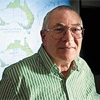
 Brett Ramey (Iowa Tribe of Kansas and Nebraska) is an educator and program developer with over 15 years of experience working at the intersections of ecological, cultural and community health. His work has included developing and instructing courses on food systems, climate change and Indigenous science at Tribal Universities and medical school enrichment programs, conducting community-centered research on health disparities, facilitating healing retreats for cancer survivors and elevating equity and inclusion discourse within local, regional and National food justice, health equity and environmental organizations. He is the Director of the Doris Duke Conservation Scholars Program at the University of Washington, a national undergraduate student program that infuses conservation practice with cultural identities and environmental justice.
Brett Ramey (Iowa Tribe of Kansas and Nebraska) is an educator and program developer with over 15 years of experience working at the intersections of ecological, cultural and community health. His work has included developing and instructing courses on food systems, climate change and Indigenous science at Tribal Universities and medical school enrichment programs, conducting community-centered research on health disparities, facilitating healing retreats for cancer survivors and elevating equity and inclusion discourse within local, regional and National food justice, health equity and environmental organizations. He is the Director of the Doris Duke Conservation Scholars Program at the University of Washington, a national undergraduate student program that infuses conservation practice with cultural identities and environmental justice.
 Kim Richman is an accomplished trial attorney in both state and federal courts, with experience litigating dozens of trials to verdict in New York City, as well as negotiating class action settlements across the nation. Mr. Richman is dedicated to using the class action device in a creative and activist manner, seeking meaningful change for consumers, non-profits, and ethical businesses alike. Mr. Richman's work is inspired by the principles of Tikkun Olam, "To Repair the World." His cases address law and policy issues ranging from public health and sustainability to protecting animal rights and civil liberties. He also focuses on keeping our food systems unadulterated, protecting our privacy online, and defending our environment against corporate interests. Most recently, Mr. Richman is targeting pesticides, including neonicitinoids, in everyday consumer products such as oatmeal and applesauce.
Kim Richman is an accomplished trial attorney in both state and federal courts, with experience litigating dozens of trials to verdict in New York City, as well as negotiating class action settlements across the nation. Mr. Richman is dedicated to using the class action device in a creative and activist manner, seeking meaningful change for consumers, non-profits, and ethical businesses alike. Mr. Richman's work is inspired by the principles of Tikkun Olam, "To Repair the World." His cases address law and policy issues ranging from public health and sustainability to protecting animal rights and civil liberties. He also focuses on keeping our food systems unadulterated, protecting our privacy online, and defending our environment against corporate interests. Most recently, Mr. Richman is targeting pesticides, including neonicitinoids, in everyday consumer products such as oatmeal and applesauce.
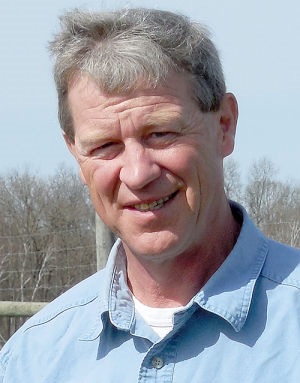 Jim Riddle - For more than 30 years, Jim Riddle has been an organic farmer, gardener, inspector, educator, policy analyst, author and avid organic eater. Jim was founding chair of the Winona Farmers Market Association and the International Organic Inspectors Association, (IOIA), and co-author of the International Organic Inspection Manual. Jim served on the Minnesota Department of Agriculture’s Organic Advisory Task Force for many years and was instrumental in passage of Minnesota’s landmark organic certification cost-share program, which now is a Farm Bill program that provides 75% reimbursement for organic certification costs nationwide. Jim worked for the University of Minnesota as Organic Outreach Coordinator and as Organic Research Grants Coordinator for Ceres Trust. Jim owns and operates Blue Fruit Farm, where he and his wife grow blueberries, black currants, elderberries, aronia berries, honeyberries and more. Jim served on the Leadership Team for eOrganic, the national Extension Community of Practice for organic agriculture and on the Citizens Board of the Minnesota Pollution Control Agency. Jim is former chair of the USDA National Organic Standards Board and is a leading voice for organic agriculture.
Jim Riddle - For more than 30 years, Jim Riddle has been an organic farmer, gardener, inspector, educator, policy analyst, author and avid organic eater. Jim was founding chair of the Winona Farmers Market Association and the International Organic Inspectors Association, (IOIA), and co-author of the International Organic Inspection Manual. Jim served on the Minnesota Department of Agriculture’s Organic Advisory Task Force for many years and was instrumental in passage of Minnesota’s landmark organic certification cost-share program, which now is a Farm Bill program that provides 75% reimbursement for organic certification costs nationwide. Jim worked for the University of Minnesota as Organic Outreach Coordinator and as Organic Research Grants Coordinator for Ceres Trust. Jim owns and operates Blue Fruit Farm, where he and his wife grow blueberries, black currants, elderberries, aronia berries, honeyberries and more. Jim served on the Leadership Team for eOrganic, the national Extension Community of Practice for organic agriculture and on the Citizens Board of the Minnesota Pollution Control Agency. Jim is former chair of the USDA National Organic Standards Board and is a leading voice for organic agriculture.
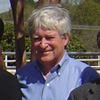 Routt Reigart, M.D. is Professor of Pediatrics at Medical University of South Carolina and has conducted university affiliated clinical trials since 1971. Routt is one of the nation’s top pediatric expert on pesticides. His research interests include children's environmental health issues, general pediatrics, and toxicology. Routt has been Chair of the EPA’s Children's Health Protection Advisory Committee, a member of EPA/USDA/Tolerance Reassessment Advisory Committee and the FIFRA Science Advisory Panel, and CDC Chair for the Childhood Lead Poisoning Advisory Committee. He is also co-editor of EPA's Recognition and Management of Pesticide Poisonings. Dr. Reigart is president of the Beyond Pesticides board of directors.
Routt Reigart, M.D. is Professor of Pediatrics at Medical University of South Carolina and has conducted university affiliated clinical trials since 1971. Routt is one of the nation’s top pediatric expert on pesticides. His research interests include children's environmental health issues, general pediatrics, and toxicology. Routt has been Chair of the EPA’s Children's Health Protection Advisory Committee, a member of EPA/USDA/Tolerance Reassessment Advisory Committee and the FIFRA Science Advisory Panel, and CDC Chair for the Childhood Lead Poisoning Advisory Committee. He is also co-editor of EPA's Recognition and Management of Pesticide Poisonings. Dr. Reigart is president of the Beyond Pesticides board of directors.
 Erin Rupp has been an informal science educator for her adult life and a beekeeper for the past ten years. She founded Pollinate Minnesota in January 2015, to connect students and teachers of all ages to live honey bees and to the science, policy and media story of pollinator decline. She loves experiential inquiry education, the Midwest, insects, fresh tomatoes, and pear honey. She also loves how the seemingly tiny work bees and other pollinators do connects directly to our role in -and impact on- ecosystems. This connection is discover-able and understandable by second graders and State Representatives alike. While incubating the programming that is now Pollinate Minnesota within the Minneapolis beekeeping business, The Beez Kneez, for three years, Erin experienced, along with two other beekeepers, an acute pesticide kill of one of her Beez Kneez hives. She and others mobilized out of that experience, and in 2014, helped to get two nationally unprecedented pollinator protection laws passed in Minnesota. Pollinate Minnesota continues this focus on pollinator advocacy, and Erin works with local municipalities, and our state and region to become pollinator friendly. She spearheaded this work with Minneapolis and St. Paul. She also consults with communities nationally. Erin's a graduate of Macalester College in St. Paul and grew up in Marshfield, Wisconsin. She serves on Governor Dayton’s Committee for Pollinator Protection.
Erin Rupp has been an informal science educator for her adult life and a beekeeper for the past ten years. She founded Pollinate Minnesota in January 2015, to connect students and teachers of all ages to live honey bees and to the science, policy and media story of pollinator decline. She loves experiential inquiry education, the Midwest, insects, fresh tomatoes, and pear honey. She also loves how the seemingly tiny work bees and other pollinators do connects directly to our role in -and impact on- ecosystems. This connection is discover-able and understandable by second graders and State Representatives alike. While incubating the programming that is now Pollinate Minnesota within the Minneapolis beekeeping business, The Beez Kneez, for three years, Erin experienced, along with two other beekeepers, an acute pesticide kill of one of her Beez Kneez hives. She and others mobilized out of that experience, and in 2014, helped to get two nationally unprecedented pollinator protection laws passed in Minnesota. Pollinate Minnesota continues this focus on pollinator advocacy, and Erin works with local municipalities, and our state and region to become pollinator friendly. She spearheaded this work with Minneapolis and St. Paul. She also consults with communities nationally. Erin's a graduate of Macalester College in St. Paul and grew up in Marshfield, Wisconsin. She serves on Governor Dayton’s Committee for Pollinator Protection.
 Laurie Schneider is the Co-Executive Director, Pollinator Friendly Alliance, based in the St. Croix River Valley, Minnesota. The Alliance protect pollinators through public education programs, awareness events, community engagement, habitat restoration and reducing pesticides. She is a devout environmentalist and bringer together of people. Her Father was the founder of the national catch & release program for trout and recruited little Laurie to help save Wisconsin rivers from pollution early on. She grew up spending summers on the river with Dad and at her older sister’s organic farm hand picking potato bugs and milking goats. She’s been a volunteer for conservation and animal rescue efforts since she can remember, and most recently, founder of the Pollinator Friendly Alliance. Laurie has an innate and loyal relationship with the natural world and works hard to protect pollinators so in need of our help.
Laurie Schneider is the Co-Executive Director, Pollinator Friendly Alliance, based in the St. Croix River Valley, Minnesota. The Alliance protect pollinators through public education programs, awareness events, community engagement, habitat restoration and reducing pesticides. She is a devout environmentalist and bringer together of people. Her Father was the founder of the national catch & release program for trout and recruited little Laurie to help save Wisconsin rivers from pollution early on. She grew up spending summers on the river with Dad and at her older sister’s organic farm hand picking potato bugs and milking goats. She’s been a volunteer for conservation and animal rescue efforts since she can remember, and most recently, founder of the Pollinator Friendly Alliance. Laurie has an innate and loyal relationship with the natural world and works hard to protect pollinators so in need of our help.
 Robert Shimek is Executive Director of the White Earth Land Recovery Project since February 2014 and was one of the founding board members of the organization. He has been involved in events highlighting the effect of pesticides on the White Earth community in Minnesota.
Robert Shimek is Executive Director of the White Earth Land Recovery Project since February 2014 and was one of the founding board members of the organization. He has been involved in events highlighting the effect of pesticides on the White Earth community in Minnesota.
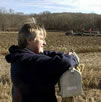
Terry Shistar, PhD, holds a Ph.D. in Systematics and Ecology from the University of Kansas, where she also taught seminars in hazardous materials policy, risk assessment, and environmental ethics, and challenged students to find new paradigms for environmental policies. She is a hands-on board member, getting involved in project work, in addition to the “normal” board activities. She is a regular contributor to Pesticides and You and Beyond Pesticides’ reports, such as Ending Toxic Dependency (2007), and comments on regulatory issues, with an emphasis on issues before the National Organic Standards Board. Terry has been a member of the Beyond Pesticides board of directors since 1984; board president from 1988 to 1993; and serves as board secretary.

Amy van Saun, JD is an attorney in Center for Food Safety (CFS)’s Portland, Oregon office. Amy is a graduate of Lewis & Clark Law School with a certificate in Environmental and Natural Resources Law and a passion for public interest environmental and food law. Amy is a former CFS law clerk, and joined CFS as an attorney in 2015, following a practice in New York focusing on complex environmental insurance litigation. As part of CFS’s legal team, Amy works on CFS’s active docket of impact litigation and high-profile cases on issues related to pollinators and pesticides, organics, genetic engineering, concentrated animal feeding operations (CAFOs or factory farms), aquaculture, and food labeling. When not practicing public interest food law, Amy can be found raising backyard ducks, cooking organic meals, and watercolor painting.
 Paul Wotzka is a hydrologist/consultant working in Southeastern Minnesota on watershed protection and restoration. He has previously worked for the Minnesota Department of Agriculture and Minnesota Pollution Control Agency as a hydrologist. He received his Bachelor of Civil Engineering Degree from the University of Minnesota's Institute of Technology . In addition to his work on water issues, Paul and his family operate a small farm where they grow fruit, specialty vegetables, and nut crops near Weaver, Minnesota. On their farm, they practice principles of permaculture, organic agriculture, and soil health. Paul has also worked with area farmers as a farm transition coach to help retiring farmers connect with beginning farmers.
Paul Wotzka is a hydrologist/consultant working in Southeastern Minnesota on watershed protection and restoration. He has previously worked for the Minnesota Department of Agriculture and Minnesota Pollution Control Agency as a hydrologist. He received his Bachelor of Civil Engineering Degree from the University of Minnesota's Institute of Technology . In addition to his work on water issues, Paul and his family operate a small farm where they grow fruit, specialty vegetables, and nut crops near Weaver, Minnesota. On their farm, they practice principles of permaculture, organic agriculture, and soil health. Paul has also worked with area farmers as a farm transition coach to help retiring farmers connect with beginning farmers.
Videos from the 34th National Pesticide Forum last year in Portland, ME are available to watch on our YouTube Channel.
THANK YOU! The generosity of our sponsors helps make conferences a great event year after year. The sponsors listed below contributed to the 34th National Pesticide Forum scholarship fund, making it possible for people from around the country to participate in one of the most important grassroots pesticide meetings of the year. Learn more about becoming a sponsor for this years' forum. Click on the logos for more information.










